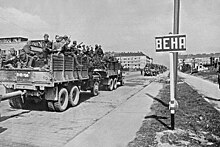Fly maybeetle!
Fly maybeetle! My father, the end of the war, Cohn and I is an autobiographical novel by Christine Nöstlinger . The title of the children's and youth book is based on the well-known folk song Maikäfer flies . The novel was published in 1973 and is set in Vienna at the end of the Second World War and in the post-war period . It has been translated into English , Spanish , Dutch , Swedish , Norwegian and Finnish . In 2016 the film adaptation of the book, directed by Mirjam Unger, premiered at Diagonale .
content
In the novel, eight to nine year old Christine tells how she experienced the end of the Second World War and the post-war period. The book is written from the first person perspective ( homodiegetic and intradiegetic narrator) and contains internal monologues .
Christine's father is fighting in the Wehrmacht , is badly wounded and flees as a deserter . He returns to his family, who live in a villa in Neuwaldegg , because their old house in the Vienna district of Hernals was destroyed in the bombing of Vienna by the Allies . Christine lives there with her younger sister and her mother, together with the daughter-in-law of the villa owner Frau von Braun, and their two children Gerald and Hildegard. Throughout the novel, Christine's grandparents live in her old apartment, which Christine calls the “doll's house”, because the house in which the apartment is located was bombed and most of the rooms can be seen from the outside.
Almost everyone in their settlement, including the National Socialist villa owners, fled to the west as the Soviet Red Army is advancing further and further. When the "Russians" march in, the father's uniform is burned. This is hidden in the basement to get to safety. The Russian soldiers ask about German soldiers, but the family members and wife von Braun deny that the father is hiding here. The Russians consider Frau von Braun's son Gerald to be a German (Germanski) because of his blond hair , but do not punish him.
Later, the father lives in public in the villa, because "I can't hide from the Russians forever". They believe him that he was never a German soldier, because he has large bumps on his whole leg from the shrapnel and can only hobble.
Meanwhile Christine becomes friends with the Russian field cook Cohn, a tailor from Leningrad. When the latter helps her to run away from home so that she can visit her grandparents who have stayed behind in Vienna, she is mistaken for and captured as a Russian deserter.
At the end of the book the Soviet combat troops move away, the entourage comes, but contrary to what was feared, they take neither food nor the villas of the residents. In addition, the family is brought back to Vienna in a carriage brought by their father, where they will live as they did before the entry of the Red Army. Cohn no longer appears.
criticism
The novel illustrates the dilemma of upbringing in a time of upheaval and changing values and the childhood of a generation that was shaped by the Second World War and the absence of a father. The Tübingen Institute for Peace Education praises the book: “The basic tone of the story fluctuates between tragedy and comedy. The friendship between the girl and the soldier is a symbol of humanity in an inhuman time. "
Awards
- 1974 German Youth Literature Award - shortlist -
- 1982 Zilveren Griffel (Dutch edition: Het huis in No Man's Land )
expenditure
- Fly maybeetle. My father, the end of the war, Cohn and me . Beltz and Gelberg, Weinheim 1996, ISBN 3-407-78224-1 (hardcover).
- Fly maybeetle! My father, the end of the war, Cohn and me . Beltz and Gelberg, Weinheim / Basel. 1973, ISBN 3-407-80224-2 (cardboard).
literature
- Marc Böhmann, Regine Schäfer-Munro: "Maikäfer, fly!" In class: Teacher's guide to the youth novel by Christine Nöstlinger. Grades 7–9, with copy templates . Beltz Verlag, Weinheim 2009, ISBN 978-3-407-62650-9 .
Web links
Individual evidence
- ↑ a b Fly Away Home by Christine Nöstlinger . In: Librarything. Retrieved July 31, 2011.
- ↑ Nöstlinger meets Pippi Longstocking. orf.at of March 8, 2016.
- ↑ Book analysis at Katarina force: University of Frankfurt; Seminar "War childhood in children's and youth literature". Retrieved July 30, 2011 .
- ↑ a b c Stefan Altschaffel: On the presentation of the upbringing problem with special consideration of the generation conflict in selected texts by Christine Nöstlingers, thesis 2007 in the department of German studies at the University of Potsdam . Grin Publishing House; BoD, 2008, ISBN 978-3-640-13017-7 , pp. 54 ff . ( limited preview in Google Book search).
- ↑ a b Mei-Chi Lin: Family conflict in children's and youth literature: literature as a mirror of social reality . Tectum Verlag, 2002, ISBN 3-8288-8409-1 , p. 139 ff . ( limited preview in Google Book search).
- ↑ Ria Proske: Cockchafer fly! In: War and Peace. Selected books for children and young people. Annotated directory. 15th, updated online edition, Cologne 2008. Institute for Peace Education Tübingen eV, accessed on July 31, 2011 .
- ↑ http://schulen.eduhi.at/priv.mhs.wels/archiv/jahr0809/buch_ns/maikaefer.pdf
